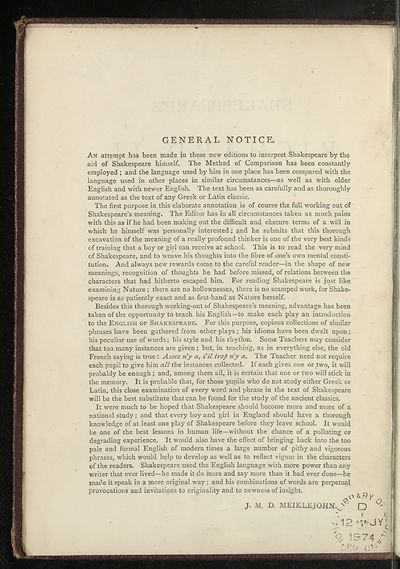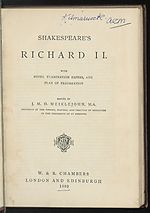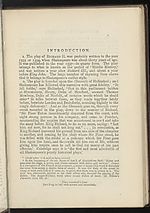Download files
Complete book:
Individual page:
Thumbnail gallery: Grid view | List view

An attempt has been made in these new editions to interpret Shakespeare by the
aid of Shakespeare himself. The Method of Comparison has been constantly
employed ; and the language used by him in one place has been compared with the
language used in other places in similar circumstances—as well as with older
English and with newer English. The text has been as carefully and as thoroughly
annotated as the text of any Greek or Latin classic.
The first purpose in this elaborate annotation is of course the full working out of
Shakespeare’s meaning. The Editor has in all circumstances taken as much pains
with this as if he had been making out the difficult and obscure terms of a will in
which he himself was personally interested; and he submits that this thorough
excavation of the meaning of a really profound thinker is one of the very best kinds
of training that a boy or girl can receive at school. This is to read the very mind
of Shakespeare, and to weave his thoughts into the fibre of one’s own mental consti¬
tution. And always new rewards come to the careful reader—in the shape of new
meanings, recognition of thoughts he had before missed, of relations between the
characters that had hitherto escaped him. For reading Shakespeare is just like
examining Nature ; there are no hollownesses, there is no scamped work, for Shake¬
speare is as patiently exact and as first-hand as Nature herself.
Besides this thorough working-out of Shakespeare’s meaning, advantage has been
taken of the opportunity to teach his English—to make each play an introduction
to the English of Shakespeare. For this purpose, copious collections of similar
phrases have been gathered from other plays; his idioms have been dwelt upon;
his peculiar use of words ; his style and his rhythm. Some Teachers may consider
that too many instances are given; but, in teaching, as in everything else, the old
French saying is true : Assez n'y a, s'il trap n'y a. The Teacher need not require
each pupil to give him all the instances collected. If each gives one or two, it will
probably be enough; and, among them all, it is certain that one or two will stick in
the memory. It is probable that, for those pupils who do not study either Greek or
Latin, this close examination of every word and phrase in the text of Shakespeare
will be the best substitute that can be found for the study of the ancient classics.
It were much to be hoped that Shakespeare should become more and more of a
national study; and that every boy and girl in England should have a thorough
knowledge of at least one play of Shakespeare before they leave school. It would
be one of the best lessons in human life—without the chance of a polluting or
degrading experience. It would also have the effect of bringing back into the too
pale and formal English of modern times a large number of pithy and vigorous
phrases, which would help to develop as well as to reflect vigour in the characters
of the readers. Shakespeare used the English language with more power than any
writer that ever lived—he made it do more and say more than it had ever done—he
made it speak in a more original way ; and his combinations of words are perpetual
provocations and invitatiqqs to originality and to newness of insight.
<?■)
J. M. D. MEIKLEJOHN.J-
aid of Shakespeare himself. The Method of Comparison has been constantly
employed ; and the language used by him in one place has been compared with the
language used in other places in similar circumstances—as well as with older
English and with newer English. The text has been as carefully and as thoroughly
annotated as the text of any Greek or Latin classic.
The first purpose in this elaborate annotation is of course the full working out of
Shakespeare’s meaning. The Editor has in all circumstances taken as much pains
with this as if he had been making out the difficult and obscure terms of a will in
which he himself was personally interested; and he submits that this thorough
excavation of the meaning of a really profound thinker is one of the very best kinds
of training that a boy or girl can receive at school. This is to read the very mind
of Shakespeare, and to weave his thoughts into the fibre of one’s own mental consti¬
tution. And always new rewards come to the careful reader—in the shape of new
meanings, recognition of thoughts he had before missed, of relations between the
characters that had hitherto escaped him. For reading Shakespeare is just like
examining Nature ; there are no hollownesses, there is no scamped work, for Shake¬
speare is as patiently exact and as first-hand as Nature herself.
Besides this thorough working-out of Shakespeare’s meaning, advantage has been
taken of the opportunity to teach his English—to make each play an introduction
to the English of Shakespeare. For this purpose, copious collections of similar
phrases have been gathered from other plays; his idioms have been dwelt upon;
his peculiar use of words ; his style and his rhythm. Some Teachers may consider
that too many instances are given; but, in teaching, as in everything else, the old
French saying is true : Assez n'y a, s'il trap n'y a. The Teacher need not require
each pupil to give him all the instances collected. If each gives one or two, it will
probably be enough; and, among them all, it is certain that one or two will stick in
the memory. It is probable that, for those pupils who do not study either Greek or
Latin, this close examination of every word and phrase in the text of Shakespeare
will be the best substitute that can be found for the study of the ancient classics.
It were much to be hoped that Shakespeare should become more and more of a
national study; and that every boy and girl in England should have a thorough
knowledge of at least one play of Shakespeare before they leave school. It would
be one of the best lessons in human life—without the chance of a polluting or
degrading experience. It would also have the effect of bringing back into the too
pale and formal English of modern times a large number of pithy and vigorous
phrases, which would help to develop as well as to reflect vigour in the characters
of the readers. Shakespeare used the English language with more power than any
writer that ever lived—he made it do more and say more than it had ever done—he
made it speak in a more original way ; and his combinations of words are perpetual
provocations and invitatiqqs to originality and to newness of insight.
<?■)
J. M. D. MEIKLEJOHN.J-
Set display mode to:
![]() Universal Viewer |
Universal Viewer | ![]() Mirador |
Large image | Transcription
Mirador |
Large image | Transcription
| Antiquarian books of Scotland > Languages & literature > Shakespeare's Richard II > (4) |
|---|
| Permanent URL | https://digital.nls.uk/109384918 |
|---|
| Description | Thousands of printed books from the Antiquarian Books of Scotland collection which dates from 1641 to the 1980s. The collection consists of 14,800 books which were published in Scotland or have a Scottish connection, e.g. through the author, printer or owner. Subjects covered include sport, education, diseases, adventure, occupations, Jacobites, politics and religion. Among the 29 languages represented are English, Gaelic, Italian, French, Russian and Swedish. |
|---|

